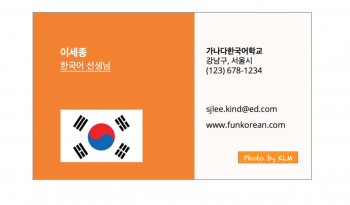Note on Business Card Etiquette in South Korea Posted by Kyung-Hwa on Oct 11, 2017 in Korean Language, Vocabulary
A business card is quite small in size but plays a key role when you meet someone. This tiny business card represents you or your counterpart’s face displaying their name, title, job, company, contact information, etc. It becomes a useful tool to initiate a conversation or in helping to figure out how to deal with each other accordingly.

When you meet someone for the first time, especially in a business setting, you will exchange business cards with your counterpart. A business card is called a 명함 in Korean. Even though 명함 is a tiny piece of paper, 명함 presents a good source of information to initiate a conversation: 이름 (name), 직업 (job), 직함 (title), 회사 (company), and 연락처 (contact information), etc.
Korean culture is based on respecting others. When you meet someone for the first time and exchange business cards, it is important to treat their business cards with respect. The following video and note will explain appropriate manners that you can apply when you exchange business cards with Koreans.
- People usually keep their business cards in a 명함집 (business card holder or case).
- Have your business cards ready to hand out. (Don’t search for it and make your counterpart to wait for you to fine your card.)
- Keep your business cards clean.
- Keep your business cards either in your shirt or inside of the suit pocket.
- For woman keep them in a purse.
- Introduce yourself before you hand out your card.
- Exchange cards while standing.
- Your name should face the other person.
- Don’t make your business cards too fancy.
* It is important to take a look at the card and confirm the person’s name, title, etc. before you put it away.
- If you are standing, keep the received card inside of your suit pocket or separate cardholder for received cards.
- When you give away your card, chest height of your counterpart is appropriate.
- It is recommended to take turns in exchanging business cards and important to receive a business card with two hands. However, when you simultaneously exchange business cards with the counterpart, hand your card with the right hand and receive the counterpart’s card with the left hand, with your left palm.
* A person with a lower rank first passes the card to a higher-ranking person. However, when you are in an equal status with your counterpart, you might exchange business cards simultaneously.
- Do not write on the card that you just received.
- When in need, ask for permission to add a note. Use the backside of the card to add information.
- Do not play with the counterpart’s card.
Every situation will be slightly different, however, remember to apply these basic protocols and show politeness during your meeting. Beside your effort to use proper etiquette, don’t forget to try to use Korean phrases such as 감사합니다 (Thank you.) and 천만에요 (You are welcome). Korean people will appreciate your effort to follow appropriate etiquette and display interests in the Korean culture.
감사합니다! (Thank you!)
***Related Vocabulary***
- 명함 (business card)
- 이름 (name)
- 직업 (job)
- 직함 (title)
- 회사 (company)
- 연락처 (contact information)
- 명함집 (business card holder or case)
- 감사합니다. (Thank you.)
- 천만에요. (You are welcome)

Build vocabulary, practice pronunciation, and more with Transparent Language Online. Available anytime, anywhere, on any device.



